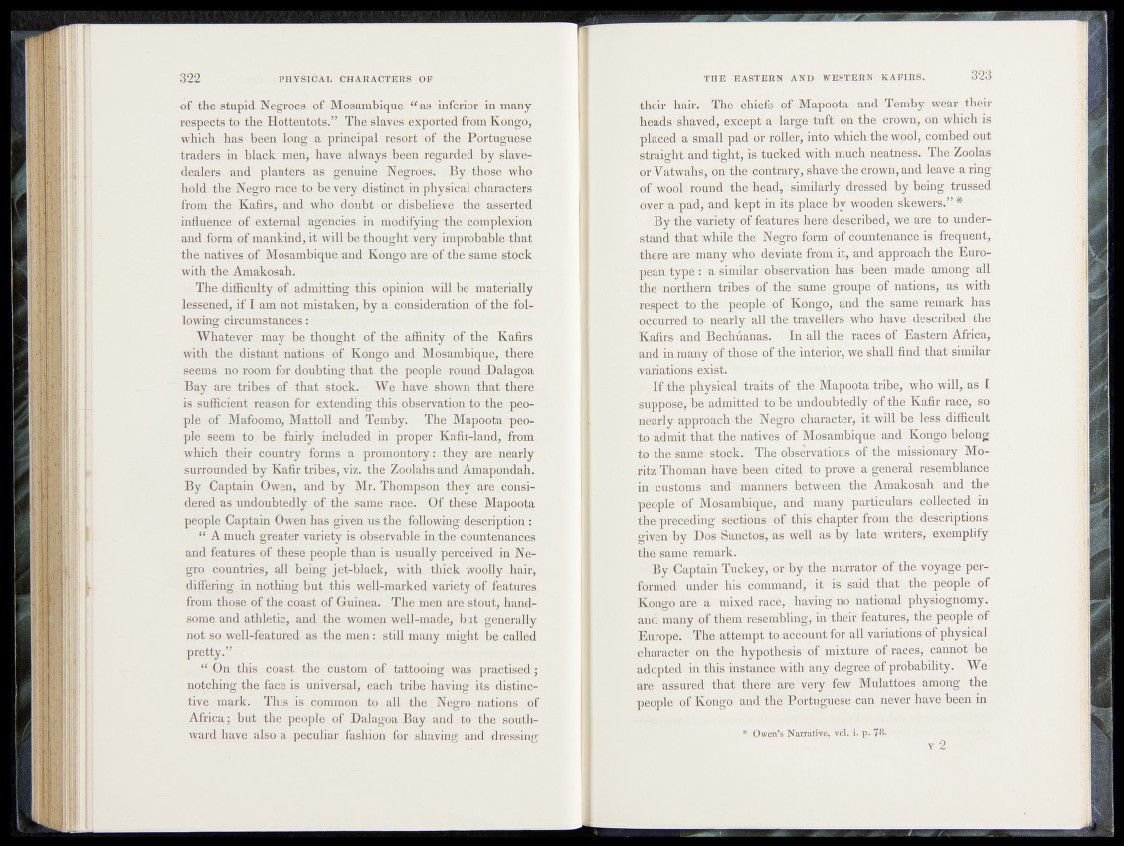
of the stupid Negroes of Mosambique “ as inferior in many
respects to the Hottentots.” The slaves exported from Kongo,
which has been fes^; principal of the Portuguese
traders in black men, have always been regarded by slave-
dealers and planters as genuine Negroes. By those who
hold the Negro race to beyery distinct in physical characters
from “the Kafirs, and . who doubt or disbelieve the asserted
influence of external - agencies in modifying the complexion
and form of mankind, it will be thought very improbable that
the natives of Mosambique and Kongo are of the same stock
with the Amakosah.
The difficulty of admitting this opinion will be materially
lessened, if I am not mistaken, by a consideration of the following
circumstances;
Whatever may be thought of the affinity of the- Kafirs
with the distant nations of Kongo and Mosambique, there
- seems no room for doubting that the people;pound Dalagoa
Bay are tribes of that stock. We have ^ shown that there
is sufficient reason for extending this observation to the people
of Mafoomo, Mattoll and Temby. The Mapoota peo-
pie seem to be fairly included in proper Kafir-land, from
which their country forms a promontory: they are nearly
surrounded by Kafir tribes, viz. the Zoolahsand Amapondah.
By Captain'Owen, and by Mr. Thompson they Sare^^fe^j-
dered as undoubtedly of the same race. Of these Mapoota
people Captain Owen has given us the following description :
“ A much greater variety is observable in the countenances
and features of these people than is usually perceived in Negro
countries, all being jet-black, with thick woolly hair,
differing in nothing but this well-marked variety of features
from those of the coast of Guinea. The men are stout, handsome
and athletic, and the women well-made, but generally
not so well-featured as the men: still many might be called
pretty.”
“ On this coast the custom of tattooing was practised;
notching the face is universal, each tribe having its distinctive
mark. This is common to all the Negro nations of
Africa,; but fhe people of Dalagoa Bay and to the southward
have also a peculiar fashion for shaving and dressing
their hair; The chiefs of Mapoota and Temby wear their
heads shavedyexeppt a large tuft on the crown, off which is
placed. a%JÉêill' pad- or--roller, into which the wool, combed out
straight aricHâgktj is tucked-with much^niatàesfe The Zoolas
or Vatwahsybn the 'contrary, shave the drown, and leave a ring
of wool’’round theihead, similarly dressed! b y being trussed
pad, and*kep.ti in its place by wooden skewers.1”,* -
By the variety offfdatures h'erê'described, we. are1 to milder-
stanch that while the-Negro form of^ipuntenande is frequent,
there are many who ,deviate from it, and approach the European
type : a simiferyobsçryatïôn has been made amorig all
the northern- tribes'rofi$he .game grouped nations,-as .with
respect to the people'’of Kongo, arid the same remark has
occurred to nearly all the;travellers -who haveJ described-the
Kafirs and Bechuanas. . In all the races of Eastern Africa^
and in many of-those of the interior; we shall find-that similar
variatiohS/?exist. >
If the" physical traits of the Mapoota tribe, who will, as t
suppose, be admitted to be undoubtedly of the Kafir race, so
nearly approach the Negro character, it will be! less difficult
to admit that the natives of Mosàîribif&e and Kongo belong
to the same stock. The observations of the missionary Moritz
Thoman have been cited to prove a general resemblance
in customs and manners between the Amakosah and th#<
people of Mosambiquef and many particulars collected in
the preceding Sections of this chapter from the- description^
given by Dos Sanctos, as well as by late writers, exemplify
the same remark. .
By Captain Tuckey, or by the narrator of the voyage performed
under his command, it said that the people of
Kongo are a mixed racé, baring no national physiognomy,
and many of them resembling, in their features; the people of
Europe. The attempt to account for all variations of physical"
character on the hypothesis of mixture of races, cannot -be
adopted in this instance with any degree of probability. Wo;
are assured that there are very few Mûîattoes among the
people of Kongo and' the Portuguese can never have been in
y 2
Owen’s Narrative, vol. i. p. 78.